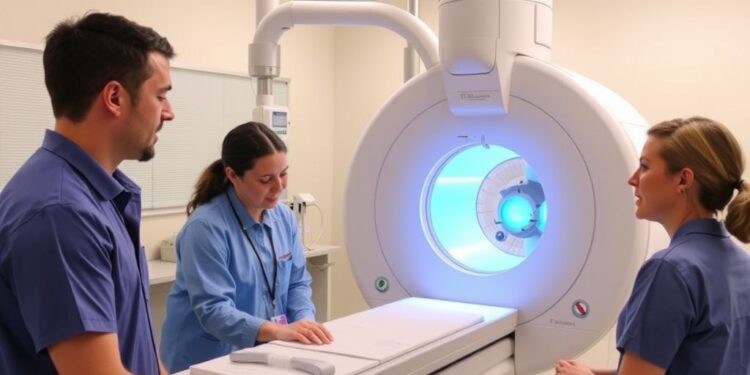Recent advancements in cancer treatment are emerging from the London Health Sciences Centre Research Institute (LHSCRI), where the results of a promising Phase I clinical trial have been revealed. This trial, designated as the ARREST trial, focused on the use of high-precision radiation therapy to treat patients with cancer that has metastasized to multiple sites throughout their bodies. The study has provided vital evidence supporting the safety of stereotactic ablative radiotherapy (SABR) for individuals facing limited therapeutic options due to the extent of their disease. Published in the esteemed International Journal of Radiation Oncology, Biology, Physics, the implications of the findings are both profound and encouraging.
SABR represents a highly targeted form of radiation treatment, previously studied predominantly for patients whose cancers have spread to fewer than ten locations. In those cases, SABR has demonstrated an ability to prolong the time before new cancerous lesions emerge, improving both progression-free survival and, in select patients, overall lifespan. However, the focus on polymetastatic disease—in which cancer has proliferated to over ten sites across various organs—poses a unique challenge and opportunity. This new study is a significant step in exploring the boundaries of SABR, specifically evaluating its efficacy and safety within this more advanced patient population.
The principal investigator, Dr. Glenn Bauman, who is both a scientist at LHSCRI and a practicing radiation oncologist, shed light on the study’s intent. Prior experiences indicated that targeted radiation could effectively control the growth of tumors in patients with fewer than five metastatic spots. Nonetheless, the pressing question remained: Could this same technique be safely employed for patients with a greater number of metastatic lesions? The ARREST trial aimed to clarify this uncertainty, delving into the practicalities and outcomes associated with treating patients harboring more extensive cancer spread.
In total, thirteen patients participated in the trial at LHSC’s Verspeeten Family Cancer Centre. Each participant received five doses of radiation through SABR, a process meticulously designed to balance efficacy against the potential for adverse effects. The results yielded an encouragingly safe profile; adverse toxicities remained within acceptable levels throughout the treatment. Dr. Bauman noted the absence of significant side effects, emphasizing the general tolerability of the therapy, which is of utmost importance when treating patients with advanced cancer.
Additionally, while the creation of individualized treatment plans for patients with multiple metastases entailed a higher degree of complexity, researchers found that it remained feasible for all but one participant. This adaptability speaks volumes about the capabilities of the radiation oncology team and the advanced technologies at their disposal, which allow for precise targeting of cancerous cells while shielding healthy tissue from excess radiation exposure.
The next steps in this line of research have already commenced, with a larger Phase II trial taking shape. This upcoming trial will widen its focus beyond mere safety metrics, encompassing the evaluation of meaningful patient benefits stemming from this form of treatment. The ARREST-2 trial will specifically engage patients opting out of immediate drug therapies, examining whether extensive radiation treatment can significantly impact survival rates and overall patient quality of life.
The significance of the ARREST trial extends beyond its immediate findings; it represents a beacon of hope for patients grappling with the realities of advanced cancer. As the medical community strives to innovate and explore uncharted territories in oncology, studies like this empower healthcare providers to rethink traditional treatment paradigms. Therein lies the promise of enhancing the efficacy of radiation therapy and potentially offering renewed hope to those who have previously had limited options available for their treatment.
The successful execution of the ARREST trial was bolstered by the generosity of the London Health Sciences Foundation, highlighting the importance of community engagement and support in advancing cancer research. Through continued collaborative efforts, enhanced funding, and patient involvement, researchers and clinicians at LHSCRI pave the way for future breakthroughs that can improve the lives of patients not only in London, Ontario, but around the world.
As we reflect on the findings of the ARREST study, it becomes crucial to recognize the intricacies of conducting clinical trials amidst the complexities of patient disease profiles. The journey from hypothesis to practiced treatment is fraught with challenges, yet each successful step reinforces the critical nature of innovation in oncology. This trial represents a positive stride towards addressing the growing need for effective interventions in the face of polymetastatic cancer.
Ultimately, the success of such trials can serve as a rallying point within the research community, fostering collaboration, fostering patient advocacy, and spearheading initiatives geared towards comprehensive cancer treatments. The hope that ARREST will pave the way for new clinical pathways is profound, potentially changing the landscape of cancer therapy for patients who need it the most.
As the medical community and patients alike look forward to future developments stemming from this research, the importance of targeting treatments effectively and safely in advanced cancer cases cannot be overstated. The ARREST trial sets an invigorating tone for exploring enhanced approaches in personalized medicine, where patient-centric challenges guide the future of cancer treatment.
Subject of Research: People
Article Title: Ablative Radiation Therapy to Restrain Everything Safely Treatable (ARREST): A Phase 1 Study of Stereotactic Ablative Radiation Therapy for Polymetastatic Disease
News Publication Date: 1-Dec-2024
Web References: International Journal of Radiation Oncology, Biology, Physics
References: None
Image Credits: None
Keywords: Cancer patients, Radiation therapy
Tags: advanced metastatic cancer treatmentARREST trial findingscancer treatment clinical trialshigh-precision radiation therapy for cancerimplications of SABR in advanced cancerInternational Journal of Radiation Oncology researchLondon Health Sciences Centre Research Instituteoverall lifespan improvement in cancer therapypolymetastatic disease managementprogression-free survival in cancer patientssafety of stereotactic ablative radiotherapytargeted radiation treatment efficacy





